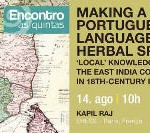Sept 2015
The article “Hunger, food and drink in Brazilian popular music: a brief overview” reflects on how the themes of food and drinks are addressed in the so-called protest song, a Brazilian musical genre characterized by a social criticism to military rule.
Researchers Francisco de Assis Guedes de Vasconcelos, Mariana Perrelli Vasconcelos and Iris Helena Guedes de Vasconcelos investigate some popular songs written over the years of the Brazilian military dictatorship (1964-1985), the historical context in which the “icons” of MPB emerged including the composers Caetano Veloso, Chico Buarque, and Gilberto Gil, among others.
Selecting some musical compositions of the period, the research sought to analyze the themes of hunger, consumption of soft drinks and other beverages and consumption of beans with rice addressed by MPB artists throughout the years of military dictatorship. The article explains the researchers option to focus the analysis on the consumption of soft drinks and other beverages, beans and the combination of beans with rice.
According to the article, scientific evidence has highlighted these two markers as risk factors (consumption of soft drinks and other sweetened drinks) and protective factors (the combination of beans with rice). Besides that, they assumed the premise that the consumption of soft drinks (particularly Coca-Cola) is an eating habit imported from the USA, as an indicator of adopting an unhealthy eating habit, whereas the practice of consuming beans and rice is an indicator of a healthy eating habit.
The analysis reveals that the protest song portrayed elements of the economic, political and social contexts and led to the diffusion of healthy or unhealthy eating habits or ideologies, contributing to the construction of the Brazilian dietary identity.
Read the full article:
Vasconcelos, Francisco de Assis Guedes de, Vasconcelos, Mariana Perrelli and Vasconcelos, Iris Helena Guedes. Hunger, food and drink in Brazilian popular music: a brief overview. Hist. cienc. saude-Manguinhos, Set 2015, vol.22, no.3, p.723-741. ISSN 0104-5970
Read the full issue of HCSM (vol.22 no.3 Rio de Janeiro jul./set. 2015).







